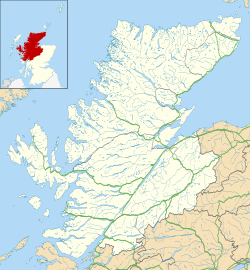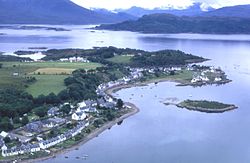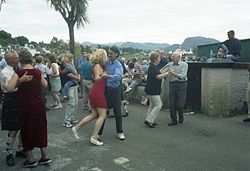Plockton
Plockton
| |
|---|---|
 Plockton as viewed from the bay | |
Location within the Highland council area | |
| Population | 378 |
| OS grid reference | NG803334 |
| Community council |
|
| Council area | |
| Lieutenancy area | |
| Country | Scotland |
| Sovereign state | United Kingdom |
| Post town | PLOCKTON |
| Postcode district | IV52 |
| Dialling code | 01599 |
| Police | Scotland |
| Fire | Scottish |
| Ambulance | Scottish |
| UK Parliament | |
| Scottish Parliament | |
| Website | Plockton & District Community website |
Plockton (Scottish Gaelic: Am Ploc/Ploc Loch Aillse) is a village in the Lochalsh, Wester Ross area of the Scottish Highlands with a 2020 population of 468.[2] Plockton settlement is on the shores of Loch Carron. It faces east, away from the prevailing winds; this, together with the North Atlantic Drift, gives it a mild climate despite the far-north latitude, allowing the Cordyline australis cabbage tree to prosper.
History
[edit]Plockton was established as a planned fishing village on the northern edge of the Lochalsh, built "when introducing sheep farming in 1814-20 and removing the population from their old hamlets in Glen Garron, founded the villages of Jeantown and Plockton on Loch Carronside" (Geddes: 1945, pp38).[full citation needed]
A local laird transformed the community into a prosperous fishery, and in the process, funded the planned village. Most of the houses date from the nineteenth and twentieth centuries.
Some maritime charts, including MacKenzie (1776) and Heather (1804), mark the peninsula where the village sits as 'Plack'; however, it is generally considered that the village was built on the 'Ploc' of Lochalsh, with 'Ploc' being understood in Gaelic as pimple or bump (of Lochalsh). This usage is shared with other places such as the Plock of Kyle and Plocrapool on the Isle of Harris. Until the end of the eighteenth century, the fishing hamlet, as it was then, was known as Am Ploc (meaning 'blunt promontory' in Gaelic).[3] The ‘-ton’ (from 'town') was added to designate it as such in the English language, following the construction of the planned village around 1800.
Facilities
[edit]The village has a small general store with a café; a takeaway; a restaurant; newsagent and craft shop; three hotels with pubs; numerous B&Bs; library with free internet access and a village hall, which holds community events and art exhibitions. The Church of Scotland house of worship in the village, also used by the Free Church of Scotland, was designed by Thomas Telford.[4] The village is served by Plockton railway station, on the Kyle of Lochalsh Line, and the short Plockton Airfield, operated by the Highland Council,[5] is for light aircraft and microlights.
Nearby is Duncraig Castle, a nineteenth-century stately home built by the Matheson family. The castle was derelict for many years, having had a variety of commercial uses.
Plockton has been a popular location for many artists including those from The Edinburgh School (Adam Bruce Thomson, David Macbeth Sutherland) and continues to attract artists.[6]
Geography and tourism
[edit]
Situated on a sheltered inlet of Loch Carron, and due to the series of New Zealand cabbage trees which have dominated Harbour Street since the 1960s, Plockton has been described as having a distinctive "sub-tropical appearance".[7] Most of the land around Plockton is within the Balmacara Estate, owned by the National Trust for Scotland.
Plockton lies about 10km (6miles) northeast of Kyle of Lochalsh, and is reached by road along single-track roads that go between Kyle of Lochalsh on the A87, and Achmore on the A890.
The village is a tourist resort, often having many tourists and day-trippers in peak season. It has been deemed "arguably the prettiest village in the highlands".[8] The television series Hamish Macbeth, starring Robert Carlyle, was filmed there, substituting for the fictional Lochdubh.[9] Plockton was also used for various scenes in the film The Wicker Man[10] and the Inspector Alleyn Mysteries television series.[11][12]
Education
[edit]
Plockton is home to Sgoil Chiùil na Gàidhealtachd - the National Centre For Excellence in Traditional Music at Plockton High School, which also serves the village and a wide surrounding area. The school also hosts the Am Bàta project, teaching pupils in the art of boat building, from which a number of 'local' style boats have been produced. Some have been donated to the local sailing club - Plockton Small Boat Sailing Club - whilst others have been sold to the public. Plockton was home between 1956 and 1972 to the Gaelic scholar Sorley MacLean,[13] (Somhairle MacGill-Eain) whilst headmaster at the high school, who introduced the teaching of Gaelic and championed shinty.
Since 1991 Plockton Primary School has accommodated a Gaelic-medium education unit (GMU), where instruction is through the medium of Gaelic. 24.4% of the population in the catchment area of Plockton Primary School reports being able to speak Gaelic – the highest incidence of Gaelic-speaking on the mainland of Scotland.[14]
Football club
[edit]From 1954 the village played host to Plockton Amateur Football Club. However, from 2016, the club has been in abeyance. Plockton FC played at the Alasdair Ross Memorial Park and competed in yellow and black strips - reflected in their "Bumble Bees" nickname. They were formerly members of the West Highland Amateur Football Association.
Media
[edit]- Aerial view of Plockton
- Harbour Street, the main street in Plockton
- Street dancing on the last day of the Regatta fortnight
Climate
[edit]The Met Office operates a weather station at Plockton,[15] for which 30 year averages are available. As with the rest of the British Isles, Plockton experiences a maritime climate with cool summers and mild winters. The highest temperature was 27.7 °C recorded on 9 May 2016, and the lowest was –9.8 °C.
| Climate data for Duirinish-Plockton, 18m asl, (average highs and lows 1971-2000) | |||||||||||||
|---|---|---|---|---|---|---|---|---|---|---|---|---|---|
| Month | Jan | Feb | Mar | Apr | May | Jun | Jul | Aug | Sep | Oct | Nov | Dec | Year |
| Record high °C (°F) | 14.9 (58.8) | 11.3 (52.3) | 17.9 (64.2) | 18.9 (66.0) | 27.7 (81.9) | 20.8 (69.4) | 22.1 (71.8) | 22.1 (71.8) | 19.6 (67.3) | 15.9 (60.6) | 12.3 (54.1) | 17.2 (63.0) | 29.4 (84.9) |
| Mean daily maximum °C (°F) | 7.2 (45.0) | 7.5 (45.5) | 8.9 (48.0) | 11.2 (52.2) | 14.7 (58.5) | 16.2 (61.2) | 17.7 (63.9) | 17.5 (63.5) | 15.2 (59.4) | 12.5 (54.5) | 9.4 (48.9) | 7.7 (45.9) | 12.1 (53.9) |
| Mean daily minimum °C (°F) | 2.0 (35.6) | 2.1 (35.8) | 2.9 (37.2) | 4.1 (39.4) | 6.4 (43.5) | 8.7 (47.7) | 10.8 (51.4) | 10.7 (51.3) | 8.9 (48.0) | 6.9 (44.4) | 4.1 (39.4) | 2.7 (36.9) | 5.9 (42.5) |
| Record low °C (°F) | −8.3 (17.1) | −7.3 (18.9) | −8.2 (17.2) | −9.8 (14.4) | −9.3 (15.3) | −5.5 (22.1) | 1.8 (35.2) | −3.0 (26.6) | −5.0 (23.0) | −5.5 (22.1) | −8.2 (17.2) | −9.4 (15.1) | −9.8 (14.4) |
| Source 1: 1971-2000 averages[16] | |||||||||||||
| Source 2: Met Office and Voodoo Skies[17][18][19] | |||||||||||||
See also
[edit]References
[edit]- ^ "Plockton Community Council Website". Plockton Community Council. Retrieved 21 September 2022.
- ^ McDonald, Sally (17 May 2020). "The lost year: Holiday villagers of Plockton on the true cost of lockdown". The Sunday Post. Retrieved 2 May 2021.
- ^ Murphy, Alan (March 2013). Northwest Highlands of Scotland (1st ed.). Bath, UK: Footprint. p. 96. ISBN 9781909268241.
- ^ "Geograph:: Thomas Telford's Parliamentary Kirks". www.geograph.org.uk. Retrieved 17 July 2018.
- ^ The Highland Council, Members approve next steps for three Council owned airfields, published on 4 May 2023, accessed on 30 June 2024
- ^ "Plockton Paintings". Retrieved 16 April 2015.
- ^ Nicolson, James R. (1975). Beyond the Great Glen. London: David & Charles. ISBN 9780715367780.
- ^ Shelby, Barry (2009). Scotland for Dummies (5th ed.). Indianapolis, Indiania: Wiley Publishing. p. 357. ISBN 9780470385142.
- ^ "'Hamish Macbeth' beat's new base". 2 October 2009. Retrieved 17 July 2018.
- ^ "Where was 'The Wicker Man' filmed?". British Film Locations. Retrieved 5 June 2017.
- ^ Woods, John (1 April 1994), Dead Water, Alleyn Mysteries, Ewen Bremner, Jane Lapotaire, Eleanor David, retrieved 1 July 2024
- ^ "The Inspector Alleyn Mysteries - Dead Water - filmboards.com". filmboards.com. Retrieved 1 July 2024.
- ^ "Sorley MacLean Official Website". www.sorleymaclean.org. Archived from the original on 18 January 2013. Retrieved 14 January 2016.
- ^ "Taobh Siar Rois: A'Chomraich, Loch Carrann & Loch Aillse" (PDF). Archived from the original on 10 May 2006.
- ^ "Synoptic and climate stations". Met Office. Retrieved 9 August 2023.
- ^ "Plockton 1971-2000 averages". YR.NO. Retrieved 1 November 2011.
- ^ "Climate summaries".
- ^ "May 2016".
- ^ "Voodoo Skies - Plockton Monthly Temperature weather history". Archived from the original on 16 June 2016. Retrieved 20 May 2016.


 French
French Deutsch
Deutsch


